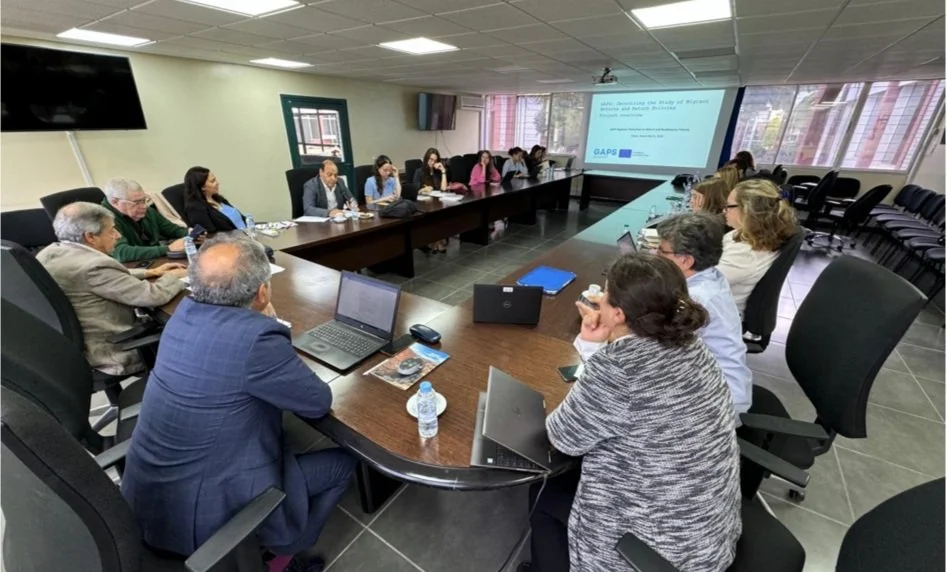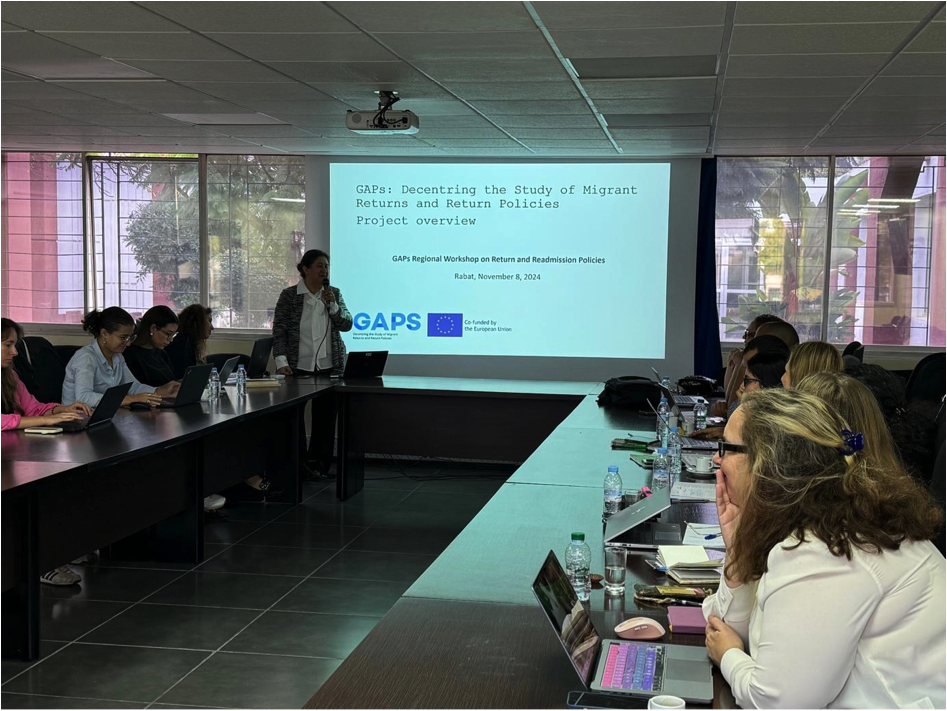Regional Workshop in Morocco to Tackle Complexities of Return and Readmission Policies
Rabat, 8 November 2024
As part of the Horizon Europe-funded GAPs project, a Regional Workshop on Return and Readmission Policies was held on November 8, 2024, at INSEA Rabat, Morocco. Organized by the Association Migration Internationale (AMI), the workshop gathered experts and stakeholders from North Africa, Europe, and beyond to critically engage with the complexities of migration governance, return, and readmission. The event offered a platform for advancing the debates on return migration, sharing insights, and fostering collaborative networks among diverse actors, including representatives from international organizations, governments, and NGOs.
Advancing Return Migration Debates
The workshop illuminated the multidimensional nature of return migration, focusing on its governance challenges and implications within varying regional and geopolitical contexts. With increasing pressure from the European Union (EU) for countries in North Africa and beyond to manage migration flows, discussions revolved around how states like Morocco and Tunisia navigate agreements with the EU while addressing reintegration challenges and border control dynamics.
The GAPs Project’s Contribution
Following the opening remarks by Bachir Hamdouch, President of AMI, who opened the workshop by underscoring the limited awareness within European institutions regarding intra-African migration patterns, and emphasizing that most African migration occurs within the continent, significantly influencing regional socio-economic dynamics and remittance flows, while Morocco faces challenges from open southern borders and tightly controlled northern borders shaped by EU border policies, the GAPs project coordination team, represented by Zeynep Şahin Mencütek (Bonn International Centre for Conflict Studies) and Soner Barthoma (Uppsala University), provided an overview of the project’s objectives and key research themes. GAPs partners shared preliminary findings, laying the groundwork for deeper exploration of migration challenges across the region. Key presentations emphasized the project’s focus on understanding return migration through localized contexts, highlighting the socio-economic, institutional, and political factors shaping outcomes.
Key Program Highlights
Participants examined critical cases, including the Morocco-Nigeria migration dynamic, Tunisia's precarious balancing act between its relations with sub-Saharan Africa and EU demands, and broader implications for transit countries like Turkey and origin countries such as Afghanistan and Nigeria. These examples underscored the diverse pressures influencing return migration policies and practices, offering a comparative lens to enrich understanding of return migration governance.
Case Studies and Insights
Migration Dynamics in Morocco
Mehdi Lahlou and Karima Belhaj (AMI) presented on migration trends in Morocco, highlighting the challenges of accurate data collection on sub-Saharan migrants in Morocco, noting the discrepancy between official statistics and migrants' lived realities.Tunisia’s Dual Pressures
Hassen Boubakri (University of Sousse) shared insights into Tunisia’s migration governance, noting a shift in EU pressure from Libya to Tunisia. He detailed challenges posed by the 2023 EU-Tunisia Memorandum of Understanding and bilateral agreements with Italy, which have politicized migration issues in Tunisia. Furthermore, his analysis highlighted the vulnerabilities of returnees, including "anticipated returnees," and the politicization of migration policies in the region.The Reintegration Landscape in Nigeria
Ngozi Uzomah (University of Nigeria) shed light on the “return and reintegration industry” in Nigeria, marked by mistrust between stakeholders and returnees, which undermines reintegration efforts. He described the stigmatization faced by returnees and the paradoxical self-stigma they adopt to combat societal discrimination, criticizing the lack of transparent cooperation among stakeholders.Stakeholder Contributions
The workshop’s concluding session featured dynamic brainstorming with stakeholders, including researchers, NGOs, and practitioners, who shared firsthand experiences and proposed actionable solutions:
Insights from Rotterdam’s Undocumented Support Point (ROS):
The ROS representative discussed the harsh realities undocumented migrants face in the Netherlands, including social exclusion and minimal support for voluntary returns. They highlighted challenges such as limited funding for shelters and political resistance to accommodating undocumented individuals.We Love Sousse (WLS):
A representative from WLS detailed the diverse reintegration challenges for returning Tunisians, including psychological, financial, and social issues. They noted that many returnees work in the informal economy and often re-migrate due to inadequate support.GIZ Tunisia:
The GIZ representative emphasized a tailored approach to reintegration, prioritizing psychological support as a precursor to economic reintegration. They outlined the difficulties returnees face, including administrative barriers and stigmatization, and advocated for cash-based assistance and better coordination among reintegration programs.IOM-Rabat:
The IOM-Rabat representative emphasized their focus on supporting returnees, especially vulnerable groups like trafficked victims, the elderly, and those with medical needs, through tailored pre-return assessments and arrival support. Despite employing an integrated reintegration approach addressing socioeconomic, psychosocial, and housing needs, limited funding and short-term programs leave many returnees unsupported. Case managers face challenges such as backlogs and assisting those in prison. Coordination with organizations like GIZ sometimes results in service duplication, highlighting the need for better data sharing. With minimal government support, IOM prioritizes community-based reintegration through local partnerships, using monitoring visits to address broader needs.
IOM-Morocco:
The IOM-Morocco representative highlighted their role in Assisted Voluntary Return and Reintegration (AVRR) projects, emphasizing protection and rights-based principles. Assistance, typically lasting 18 months, faces funding challenges, particularly for economic reintegration in West Africa. Limited vocational training and vulnerability designations hinder sustainable outcomes. Priorities include strengthening collaboration, flexible aid schemes, integrating health services, and favoring cash-based support due to informal work. Efforts focus on harmonizing referrals, improving feedback, and aligning support with returnees’ aspirations through monitoring and impact assessment.
Throughout the workshop, presentations and discussions revealed recurring themes that are central to contemporary return migration debates:
Externalization of Migration Governance: The EU’s externalization policies were critically assessed, with discussions on their implications for sovereignty, border control, and the reintegration of migrants in countries such as Morocco and Tunisia. Additionally, the instrumental and ad hoc nature of these policies often leads to long-term negative impacts, further deteriorating human rights and exacerbating global inequalities.
Challenges of Reintegration: Speakers highlighted the socio-economic, psychological, and bureaucratic barriers that returnees face, often exacerbated by short-term, unsustainable projects and limited resources.
Informality and Migration: The role of informal economies in hosting returnees and the gaps in formal reintegration programs were recurring concerns, particularly in Tunisia and Nigeria.
Data and Policy Gaps: A consistent theme was the disconnect between policy frameworks and the lived realities of returnees, compounded by unreliable data and fragmented stakeholder coordination.
Project co-coordinator Z. Sahin-Mencütek presenting the project Source: Verena Krautter
During the second round of the workshop, participants discussed potential solutions, alternative pathways, and best practices. Key points from this discussion included:
Collaboration with Local Organizations: Participants emphasized the importance of partnering with small, local organizations to provide more tailored and sustainable reintegration support.
Transparency with Returnees: Maintaining transparency in relations with returnees was highlighted to ensure realistic expectations.
Flexibility in Assistance Criteria: The need for flexible criteria for assistance was underscored to better meet returnees’ needs. Current practices often turn the criteria for accessing assistance and support into hurdles, hindering returnees' ability to benefit from these structures.
Facilitating Reintegration: Participants discussed the significant challenge of reintegrating individuals upon their return, noting that bureaucratic hurdles often hinder access to support structures. This also includes addressing social exclusion to combat the stigmatization of returnees and create pathways for their social and economic inclusion, particularly through psychosocial support and integration into formal economies.
Shared Database and Feedback Collection: The creation of a shared database for returnees using aid and support structures, as well as collecting feedback from beneficiaries, was identified as crucial for improving services.
Broader Implications for Migration Studies and Policy
This workshop marked a significant contribution to the GAPs project and broader return migration debates, offering critical insights into how return and reintegration policies are shaped by regional dynamics, international pressures, and local realities. By centering the perspectives of both stakeholders and returnees, the discussions underscored the importance of nuanced, context-sensitive approaches to migration governance.
The findings from the workshop will feed into the GAPs project’s ongoing research and policy recommendations, reinforcing the need for integrated, participatory strategies that balance national priorities with international commitments, ultimately contributing to more equitable migration governance.
Contact:


